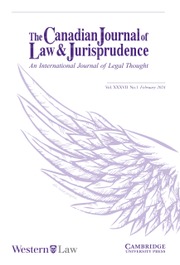The Nature of Authority
The Nature of Authority provides a comprehensive theory of the nature of authoritative guidance. It argues that the following claims exhaust the constitutive properties of authoritative tellings: authoritative tellings (1) tell subjects what to do; (2) give rise to reasons to comply; (3) are issued by personal beings and govern the behavior of personal beings; (4) are issued by rationally competent beings and govern the behavior of rationally competent beings; (5) are issued under a claim of right that counts as plausible in virtue of being grounded in a system to which subjects acquiesce as governing their behavior; (6) are issued by beings with the power to impose their will on subjects with respect to what they do; (7) create obligations to comply; and (8) are backed by a threat of detriment that is reasonably contrived to deter enough noncompliance to enable the system to minimally achieve its ends.
Product details
January 2025Hardback
9781009507813
76 pages
229 × 152 × 6 mm
0.276kg
Available
Table of Contents
- Preface
- Part I. Preliminary Considerations:
- 1. Introduction
- 2. The existence conditions of practical authority
- 3. Claims (1) through (7) and the sanctions thesis
- 4. The Razian theory of practical authority
- Part II. The Existence Conditions of Practical Authority
- 5. The constitutive properties of authoritative tellings
- 6. Other candidates for constitutive properties of authoritative tellings
- Part III. Claims (1) through (7) and the Sanctions Thesis:
- 7. Practical authority as telling people what to do
- 8. Practical authority as a source of reasons to comply
- 9. Practical authority as a personal relationship
- 10. Practical authority as rational
- 11. Practical authority as the power of will-imposition
- 12. Practical authority as grounded in a claim of right
- 13. Practical authority as giving rise to obligations
- 14. Must authoritative tellings create exclusionary reasons?
- 15. Objections – Of angels and emergency volunteers
- Conclusions
- Bibliography.



